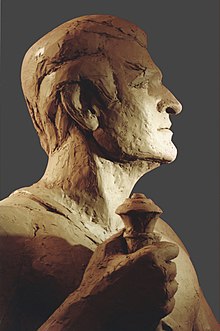| This article needs additional citations for verification. Please help improve this article by adding citations to reliable sources. Unsourced material may be challenged and removed. Find sources: "Jess Thomas" – news · newspapers · books · scholar · JSTOR (February 2022) (Learn how and when to remove this message) |
| Jess Thomas | |
|---|---|
| Born | Jess Floyd Thomas (1927-08-04)August 4, 1927 Hot Springs, South Dakota, United States |
| Died | October 11, 1993(1993-10-11) (aged 66) Tiburon, California, United States |
| Occupation | Opera singer |
| Known for | Wagnerian opera |
Jess Thomas (August 4, 1927 – October 11, 1993) was an American operatic tenor, best known for singing the works of Richard Wagner.
Biography
| This section needs additional citations for verification. Please help improve this article by adding citations to reliable sources in this section. Unsourced material may be challenged and removed. Find sources: "Jess Thomas" – news · newspapers · books · scholar · JSTOR (February 2022) (Learn how and when to remove this message) |

Jess Floyd Thomas was born in Hot Springs, South Dakota. As a child, he took part in various musical activities and studied psychology at the University of Nebraska. For several years, he worked as a high school guidance counselor, before enrolling at Stanford University for an MA. Learning that the operatic department was producing Verdi's Falstaff, he auditioned for Otto Schulmann, the vocal professor, and obtained the role of Fenton. Although by now 27 years old, Thomas decided to change careers and to become a singer. He studied with Schulmann for three years before his operatic debut in 1957. In 1958, he joined the Badisches Staatstheater in Karlsruhe, Germany. He was awarded the Wagner Medal at Bayreuth in 1963. His many appearances in North America and Europe between the late 1950s and early 1980s included fifteen seasons in 109 performances of fifteen roles at the Metropolitan Opera in New York City.
Thomas died in Tiburon, California in 1993, aged 66.
Operatic career
Thomas made his operatic debut in 1957 for the San Francisco Opera, performing in Richard Strauss's Der Rosenkavalier as the Haushofmeister. In 1958, he debuted in the title role of Richard Wagner's Lohengrin for the Karlsruhe Staatstheater at the commencement of a career in Germany.
It was at Bayreuth that he established his reputation as a Wagnerian tenor, performing in the following roles and operas:
- Parsifal 1961–63, 1965
- Lohengrin 1962, 1967
- Siegmund in Die Walküre (Bayreuth Festival on Tour in Osaka) 1967
- Walther in Die Meistersinger von Nürnberg 1963, 1969
- Tannhäuser 1966–67
- Siegfried 1969, 1976
In 1963, Thomas joined the roster of the Metropolitan Opera and went on to sing 109 performances of fifteen roles with the company, including all the major tenor roles of Wagner's work. Among the highlights of his career with the Met was appearing at the opening of the new Metropolitan Opera House at Lincoln Center, in the first performance of Samuel Barber's Antony and Cleopatra with Leontyne Price.
In 1970, at the 12th Annual Grammy Awards, Thomas won a Grammy Award for Best Opera Recording for his performance of Wagner's Siegfried, with the Berlin Philharmonic.
On December 9, 1981, San Francisco Opera general director Kurt Herbert Adler called Thomas an hour before a performance of Die Walküre. Heldentenor James King had lost his voice, and Adler asked Thomas if he would like to sing the role in an hour. "But I haven't even shaved yet", Thomas said. Though he hadn't looked at the score in years, Thomas performed the role at the age of 54, relying on a memory of the role, with some prompting. The next day, headlines proclaimed Thomas's eleventh-hour rescue for Die Walküre. Thomas's farewell performance took place in the title role of Parsifal with the Metropolitan Opera in 1982, while it was on tour in Washington, D.C.
In 1997, on request of Thomas's widow, Violeta Thomas, the Austrian sculptor Hortensia Fussy made a portrait of Jess Thomas, showing him as Siegfried with his sword. The sculpture was donated to the Austrian Theatre Museum in 2002.
References
- Sirvaitis, Karen (September 1, 2001). South Dakota. Lerner Publications. p. 69. ISBN 978-0-8225-4070-0.
- Forbes, Elizabeth (October 16, 1993). "Orbituary: Jess Thomas". The Independent (UK).
- "Classical Music Dance and Guide". New York Times. October 11, 2002. Retrieved June 9, 2009.
- "When did the new Metropolitan Opera House at Lincoln Center open?". The Metropolitan Opera FAQ. Retrieved August 3, 2006.
- "Grammy Awards 1970". awardsandshows.com. Retrieved August 15, 2023.
- "No Time to Shave". LA Times. Retrieved June 9, 2009.
- "My First Walkure". The Berkeley Daily Planet. Retrieved June 9, 2009.
- "Report about the exhibition "My father promised me no sword - heroic tenor Jess Thomas in Vienna". Wiener Zeitung. Retrieved May 24, 2002.
External links
- Jess Thomas biography
- Obituary: Jess Thomas
- Obituary in The New York Times
- History of the Tenor / Jess Thomas / Sound clips and narration